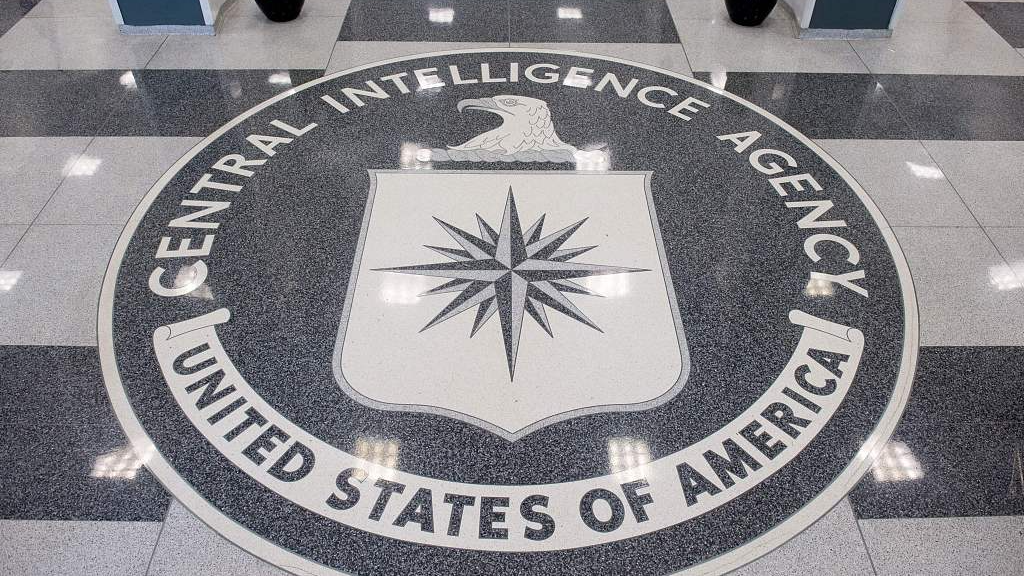Published:February 16,2022
Bradley Blankenship

The Central Intelligence Agency seal is displayed in the lobby of CIA Headquarters in Langley, Virginia. /CFP
U.S. Senators Ron Wyden of Oregon and Martin Heinrich of New Mexico, both members of the Senate Intelligence Committee, on February 10 warned the American public about a secret bulk collection program run by the CIA. As they described, the program is “outside the statutory framework that Congress and the public believe govern this collection” and has no oversight by the courts or Congress.
Such a reveal is, first of all, not unique. These situations seem to happen all the time and there is a long historical record of intelligence over-reach by the U.S. government. It’s also immensely hypocritical for the U.S. government to behave in this way when it labels countless countries as “authoritarian” for actions that don’t even compare to this.
Through far-reaching “national security” legislation and policy, the United States was the first country to develop a robust surveillance state system, according to historian Alfred W. McCoy in his 2009 book called Policing America’s Empire: The United States, the Philippines, and the Rise of the Surveillance State.
The United States had set the world standard for policing and emergency services at the very end of the 19th century, and by 1898, with the acquisition of the Philippines at that time, America became an official empire. The Philippines became the testing ground for Washington’s modern surveillance state as they pacified a revolution against its rule, utilizing tactics pioneered by Captain Ralph Van Deman – dubbed “the father of U.S. military intelligence.”
Van Deman and his team created a card-based database of every influential Phillippine figure suspected of being against U.S. colonial rule, which included details such as their political affiliations, personal finances, family and physical appearance. The captain later used these tactics when he joined the U.S.’s first internal security agency, the Bureau of Investigation (BOI), during World War I.
After retiring from the military at the rank of major general, Van Deman handed over to the military a personally curated list of a quarter of a million suspected dissidents against Washington – later used by the military, the Federal Bureau of Investigation (FBI) and administrations such as that of former President Richard Nixon.
All of this was the precursor to the modern American surveillance state, which was cemented under the creation of the National Security Agency (NSA) and its bulk collection of Americans’ data. Truly this has been the most extreme embodiment of the fact that policing and internal intelligence in America has always primarily focused on stomping down progressive dissidents, social justice movements and other grassroots struggles.
That is to say that “national security” in the eyes of Washington is more about security from its own people (or colonial subjects) and in this way it’s clear that Washington is projecting this onto other countries. What’s also quite remarkable about these latest revelations that the CIA has been collecting data on Americans is that the CIA is almost exclusively a foreign intelligence service, meaning it deals with extraterritorial affairs.
To be sure, the CIA has been caught spying on American citizens in the past. For example, the CIA surveilled anti-Vietnam War protesters in the 1960s and there were several other programs revealed through the Church Committee in the mid-1970s.
However, the FBI is the go-to agency for domestic affairs and has the legal authority to conduct operations on American soil whereas the CIA does not. The CIA’s involvement suggests that whatever this was had some link to greater U.S. foreign policy objectives, though it is hard to speculate on exactly what that could be. But it is sure to be met with serious backlash from the public for its clear violation of citizens’ privacy.
This is all compounded by the U.S.’s track record on intelligence and actions being taken now. For example, the Biden administration recently filed a case to the Supreme Court asking it to rule that federal agents cannot be held accountable for retaliating against protected speech, which would legalize the brutal force used by the Trump administration during the George Floyd protests. History’s most violent despots would blush at this disregard for civil liberties.
The U.S. has also been singling out China over alleged civil liberties infringements by its government during the 2022 Beijing Winter Games, encouraging people not to use China’s COVID-19 app. Yet, it was revealed last month that the U.S. government ordered WhatsApp to aid its spies in monitoring Chinese phones – without any explanation.
The American public deserves more information on this latest CIA program that was revealed by Senators Wyden and Heinrich, and the U.S. government would be wise to avoid throwing stones from a glass house on the issue of “authoritarianism” or “civil liberties” since it doesn’t take any of these concepts seriously.
Bradley Blankenship is a Prague-based American journalist, political analyst and freelance reporter.
cgtn.com
 Africa -China Review Africa -China Cooperation and Transformation
Africa -China Review Africa -China Cooperation and Transformation
